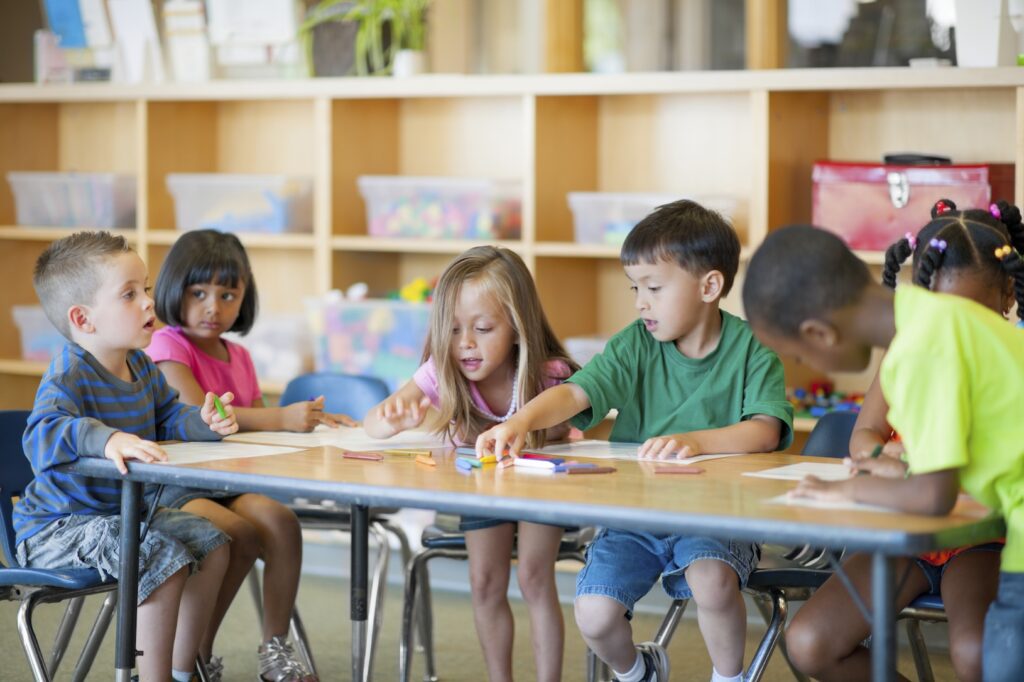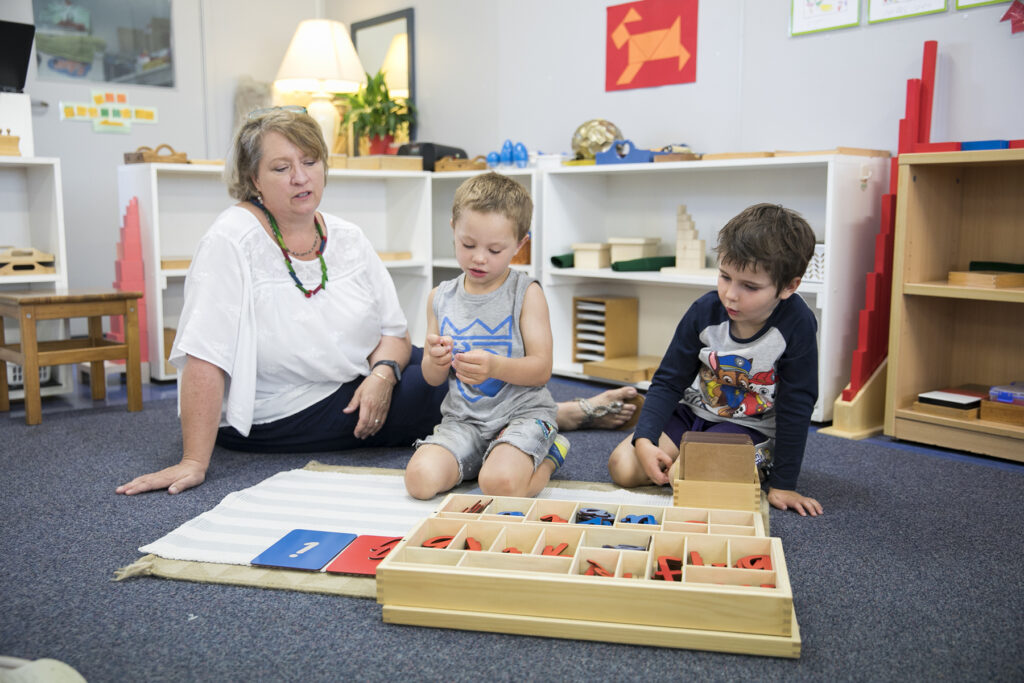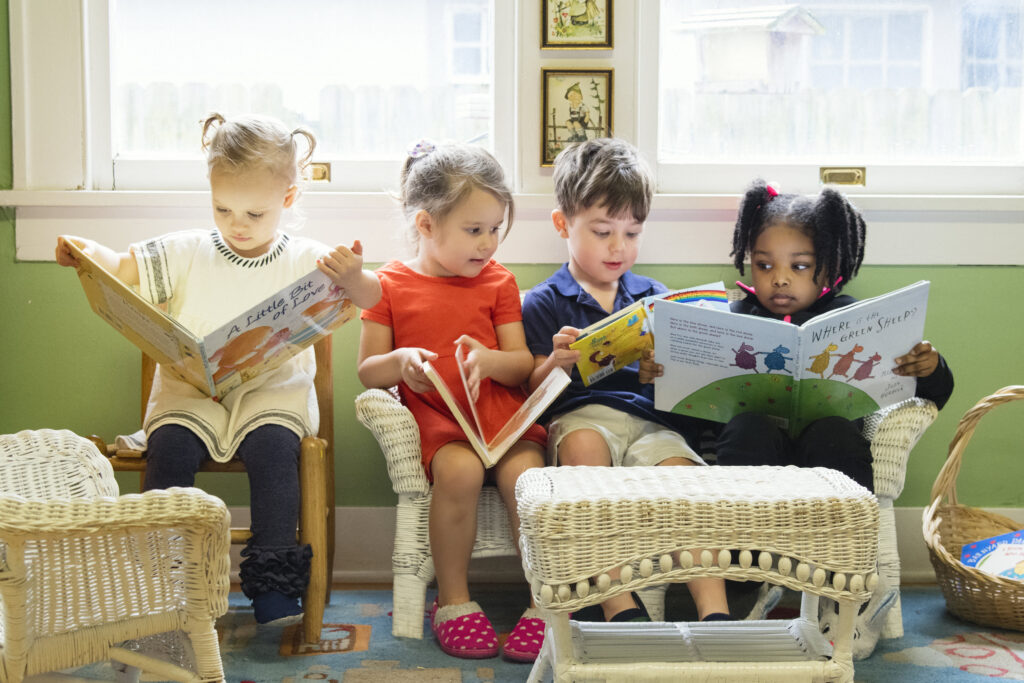A group of children is sitting and playing with some legos, and you spot your child stacking one on the tower as it topples over.
From the outside, it just looks like your child is having a bit of fun. But, in reality, it’s so much more because when a baby, toddler, or preschooler is engaged in a play-based activity, a whole world of learning is involved.
Play promotes skill development, literacy, and numeracy, among plenty of other things. That’s why incorporating play in early childhood learning is important in your child’s development.
A play-based learning curriculum covers both fun and learning and can provide the foundation for success in school and life.
What is play-based learning?
Forget boring and scripted lessons. Enter play-based learning.
Play-based learning is a teaching method that is centred around the idea of children learning through play. It’s similar to how babies learn from playing with their parents. By experiencing the world and exploring it, babies figure out how to get what they want and need in their own way.
Children are born curious, and play-based learning allows them to express that curiosity in a safe and supportive environment.
This mode of learning uses play and builds on a child’s natural curiosity and imagination. This method allows the development of young minds through creative and innovative ways instead of traditional ways. While “play” is a broad term, these are some important characteristics that feature in various types of play-based activities:
- Enjoyment: while sometimes a child might become frustrated or face challenges, enjoyment is a key element of play that motivates them to explore further
- Meaning: a child’s actions always have meaning, even if they are playing pretend
- Self-motivating: it is driven by what the child wants to do and is considered its reward
- Choice: a child has a choice about what they do, although they can also be invited or prompted to play. This makes children more open to trying out things
- Action: a child is actively involved, instead of passively taking in information – they will either be physically involved, verbally communicating, or mentally engaged with the materials or people

What are the benefits of play-based learning?
Children are supported to explore their interests, allowing them to experiment, negotiate, take risks, create meaning, build relationships, develop persistence, and feel good about themselves. And because they’re having fun, it creates a lifelong love for learning.
Of course, play is a part of childhood, but what sets apart play-based learning from regular play is that the latter is more intentional and provides a clearer path to learning and development.
Why is Play-based Learning best for your child?
Researchers have found play creates a brain that has increased flexibility. It improves the potential for learning later in life. Children who experience quality play are more likely to have well-developed memory skills and behaviour regulation, which can enhance adjustment to school and academic learning. It is beneficial for their early development stage, goes beyond their childhood, and helps build a well-rounded growing person.
What is an educator’s role in play-based learning in childcare?
For a Kids Club educator, being an intentional teacher means being deliberate and thoughtful in how they approach play. It’s the opposite of rote teaching or relying on past practices without allowing room for flexibility and a child’s individual style.
They use their training while observing children closely and tailor the learning experience to their needs. Play-based learning can occur on a continuum between completely child-led and educator-supported. This means that the child comes first in creating a learning experience, and the educator follows with guidance. An educator will expand a child’s thinking to higher levels by asking open-ended questions, challenging their ideas and providing feedback.

Examples of play-based learning:
Kids Club boasts a unique daily routine that includes large blocks of time for child-led and educator-initiated play. Ensure children are in charge of their play by providing an amazing array of hands-on tools, resources and natural equipment”.
Learning through fun cooking
Cooking experiences with children are a great example of play-based learning activities that can yield lots of learning. This activity provides equal parts of opportunities for learning and having fun. For example, while making a cake, children learn about the importance of process and measurements (numeracy skills) while developing their fine motor skills. They gain confidence in preparing food and are exposed to new words (literacy skills) and concepts. Each ingredient can be a conversation starter, such as: where do eggs come from? Then they get to experience the reward of the finished product, or if they’re unlucky, they learn about trial and error!
The extracurricular activities offered at Kids Club – sport, music, meditation and languages – provide even more opportunities for playful learning experiences.
Outdoor sport
Educators make sure to communicate with each child’s parents to share what they have learned while participating in an activity at the centre. This is an important step in the child’s learning so that parents and guardians are also kept in the loop of the process and may be able to continue it at home.
What is quality play-based learning childcare, and how is it better than others?
Two elements distinguish a quality play-based learning childcare from others: the environment and relationships.
We believe children thrive in a learning environment that is thoughtfully designed, warm and welcoming. We strive to spark the imagination and embrace nature – Kids Club designs and builds our own outdoor equipment. Our centres invite collaboration and exploration with the right materials for a quality play-based curriculum.
We really mean it when we say we put the children first. We make sure to provide holistic learning experiences and give importance to the individual growth of each child. Extra effort and care are put into creating and maintaining the learning environment here at Kids Club. After all, the environment is one of the foundations that supports the child’s learning experience.

Choose Play-based Learning. Choose Love
But this doesn’t mean much unless you’ve also got that extra ingredient – love. You can have the most beautifully designed centre, but every child needs a champion for both their wellbeing and learning. Children perceive emotion better than most adults and are more sensitive to the feelings of those around them. For this reason, the relationships between educators also matter, and that’s why we work to let the children feel loved and supported in their learning journey.


